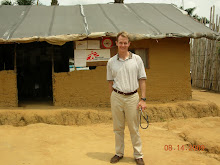


Photos: Doug with MSF vehicles; Little girl carrying a seat on her head
26 August 2009
Shocks
Couvent has a steady stream of visitors, people staying between 3 days and 2 weeks. They come from Kinshasa or Brussels, look around a bit, write a lot of reports, and enjoy the quiet of Lubutu. Morgan (pronounced mohr-gahn, with the accent on the first syllable) just left today after a 2 week visit. She's an electricity expert.
There's no electricity here except what is supplied by generators. The hospital has power 24 hours per day, of course, and Couvent gets electricity from 6 a.m. until 10 p.m. daily. Our electrical problems have two main origins: the generators themselves and the orages (pronounced "oh-raj") that come through.
Generators don't supply consistent current, at least these generators don't. The lights dim pretty frequently. Less often, the whole thing turns off if there are too many lights on or we have the microwave and toaster oven and everyone's computer running at the same time. There are kick-your-butt electrical storms (the orages) that come through two or three times per week. The lightning, thunder, and rain are intense, which can't do great things for the electrical system.
The brownouts and power surges wreak havoc on things. Two weeks before I got here, the television at Couvent was destroyed during a storm. The week I arrived one of our two refrigerators died after a lightning strike. In Lubutu, you can't go out and buy a new TV or refrigerator. You fill out a requisition and get it signed by several people. Then you send it to Kisangani. If the stuff isn't at Kisangani, your request goes onto Kinshasa. No luck there and it's forwarded onto Brussels. If they don't have it in the warehouse, someone goes shopping. You can imagine why we haven't received the new refrigerator.
This is a source for of anxiety as the remaining fridge doesn't work well, either, being just one more lightning strike away from oblivion. But since we lack all electricity from 10 p.m. until 6 a.m., nothing is particularly cold in the dying refrigerator anyway.
So what do you do when your major appliances keep exploding? You call in an electricity expert. That's Morgan. She has no formal training in engineering and isn't an electrician. She started working for MSF a few years ago, expressed an interest in this electricity stuff, and is now Ms. Electricity Fixit for MSF-Belgium.
Her Lubutu discoveries were amazing. It seems that when the hospital and Couvent were wired, no one took the orages into account. No one thought about a master fuse or lightning rods. This master fuse was described to me as a surge protector for complex electrical systems. When lightning strikes any part of the system, the surge protector trips. These things cost about 100 euro each. Morgan thought that MSF would need two, one for Couvent and one for the hospital. Lots cheaper than shipping a refrigerator from Brussels every few months.
Morgan has a special place in my heart because she proved that my French is improving. When she arrived two weeks ago, I couldn't understand a word she said. She is from France, doesn't enunciate well, speaks crazy-fast, and doesn't pause between sentences. At first it was not clear to me she was even speaking French! But something happened during her two week visit. Either she slowed down or my brain speeded up. I still only understand 50-75%, depending on ambient noise, her caffeine intake, and my fatigue. But that's a shocking improvement from two weeks ago.
Thanks, Morgan, for figuring out why our refrigerators keep exploding. And thanks for the boost in my confidence in speaking your language.








